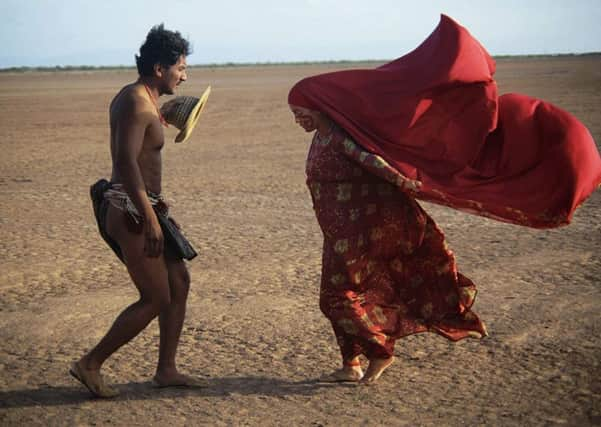Film reviews: Birds of Passage | Beats | Amazing Grace | Breakthrough | Irene’s Ghost


Birds of Passage (15) ***
Beats (15) ****
Amazing Grace (U) ***
Breakthrough (12A) *
Irene’s Ghost (PG) ****
It’s not exactly accurate to describe Colombian narco drama Birds of Passage as a genre film, but it’s not entirely inaccurate either. The new movie from the makers of 2015’s hallucinogenic arthouse hit Embrace of the Serpent has many of the genre signifiers found in films such as The Godfather, Mean Streets, Scarface and Sicario, but in zeroing in on one indigenous group, the Wayuu, and tracking the escalating drug wars via a family actively involved in the trade, it resists the cinematic temptation to serve up the sort of pulpy, visceral thrills those aforementioned American classics often revel in.
When violence punctuates the drama here – which it does, often – directors Cristina Gallego and Ciro Guerra reject sensationalism, presenting murders, executions and armed assaults in medium or master shots and saving any close-ups for the consequences of such casual barbarism.
Advertisement
Hide AdThe effect is oddly distancing, but cumulatively intriguing, part of the holistic design of a film that is attempting to track the devastating impact of an increasingly globalised trade on a point in the supply chain that rarely features in movies. It’s telling, too, that the inevitability of every disastrous thing that happens in the film can be traced back to a random encounter between the film’s protagonist, Rapayet (José Acosta), and a pair of naive US Peace Corps workers looking to score some marijuana in the summer of 1968. This might be a crime saga that pushes Americans to the sideline of the story for once, but in the grand scheme of things, the film seems to be saying, the country’s appetites are still responsible for fuelling and controlling the market.
Rapayet embraces the American capitalist message and starts chipping away at the customs of his clan by dealing marijuana to outsiders. Split into five chapters, the film tracks his rise as a criminal kingpin over 12 turbulent years. He becomes increasingly passive in the action, as if consumed by the world he’s wrought, which again acts as an strange distancing device. And yet it feels appropriate, a way to maintain a unique perspective on a story with universal ramifications.
Set in 1994, the year in which the Criminal Justice Bill signalled the end of the free-party era of illegal raves, the Scottish-made Beats pulls off the tricky task of delivering a culturally specific coming-of-age movie in a way feels simultaneously cutting edge yet affectionate. Adapted by director and co-writer Brian Welsh from co-writer Kieran Hurley’s hit play of the same name, it boasts amusing and lively lead performances from relative newcomers Cristian Ortega and Lorn Macdonald as a pair of Central Belt bampots determined to attend their first rave before their lives take divergent paths.
Shot in black-and-white, the film effectively mythologises their humdrum existence, but the monochrome also helps signify the marginalised nature of the scene politically and culturally in an era in which Britpop had the ear of the New Labour establishment. The film is at its best when it’s communicating these ideas visually, replicating for posterity an immediate-pre-internet age of taped-from-radio mixtapes, pirate DJs and elaborately organised nights out. Yet it’s really when Welsh transforms the final act into an abstract extended rave sequence – replete with the movie’s only flashes of colour – that he transcends the familiar elements of the genre to capture the ephemeral nature of this scene in all its blissed-out, impossible-to-sustain glory.
One of the mysteries of Amazing Grace is how the late Sydney Pollack ever secured another directing gig after making such a hash of this documentary capturing Aretha Franklin’s legendary live sessions at the New Temple Missionary Baptist church in Los Angeles in 1972.
The concerts themselves yielded the biggest-selling gospel album of all time, but the inexperienced Pollack – who had directed movies but not documentaries – shot it in such a way as to make it nearly impossible to synch up the sound until recent technical advances. Hence why it’s only appearing now. Compared to the contemporaneous films of cinema vérité pioneers such as the Maysles brothers and DA Pennebaker, it’s aesthetically atrocious. But as a record of one of greatest artists of the 20th century in her prime, it’s a useful historical document, giving us a rare chance to witness both her sheer command of an audience when she sings and her quiet composure between takes.
Advertisement
Hide AdBased on a true story about an American woman (played by Chrissy Metz) who believes God brought her son back to life after drowning in a frozen lake, Breakthrough could have been done in an interesting way had its makers not been intent on turning it into a Sunday school recruitment video. Taking its protagonist at her word, it’s the sort of film that explains away the medical anomalies involved in her son’s recovery as the act of a benevolent creator, who materialises as weather and the echoey voice people hear in their heads, and who will almost certainly perform miracles if you pray hard enough.
Finally this week, Irene’s Ghost is a haunting mix of documentary and animation in which British filmmaker Iain Cunningham turns detective to piece together the life story of his mother, who died before he could form any lasting memories of her. As becomes clear, making the film is his way of penetrating his family’s silence on this issue. The raw results – especially his attempts to probe his father – are heartfelt without being sentimental.